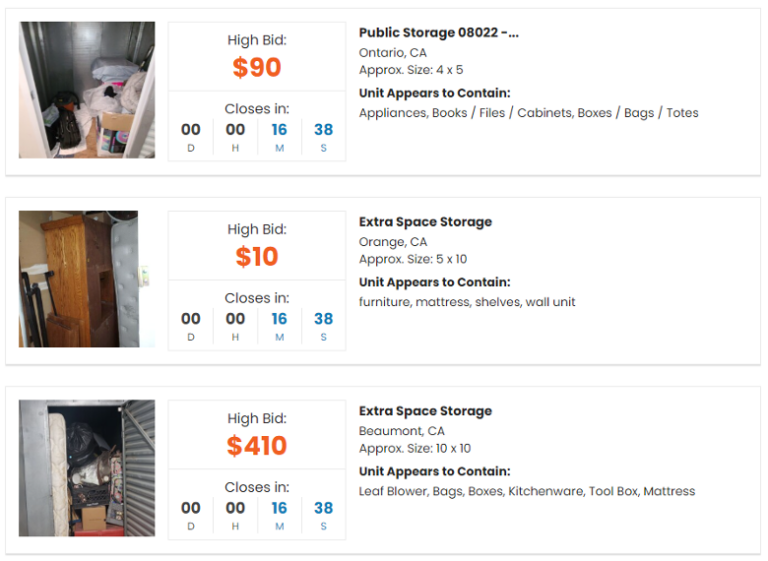Self-storage companies like Extra Space Storage or CubeSmart put units up for auction when renters fall behind on their payments. Just about anyone can participate in an auction—such as people who recently moved and want to fill their homes with thrifty purchases like furniture and artwork. Auctions are held both in-person and online. If you win the auction, be prepared to unload the unit’s contents (maybe bring some gloves) and pay on the spot.
How Storage Auctions Work
For over 8 years Move.org experts have examined pricing, credentials, and real customer reviews to give you (human) recommendations you can trust. See how we review.
At a glance
The next step after winning a storage auction is transporting those items out of the unit, and if it's a big haul, you may find yourself needing professional help. Take a look at our list of best moving companies.
What you need to know about storage auctions
How does a storage auction work?
A storage unit becomes available
Most storage units never go up for auction. When they do, it’s because the tenants fell behind on their payments. Laws vary from state to state, but most storage unit companies can put a unit up for auction somewhere between 30–90 days after the renter fails to pay.
Auctions are a last resort for storage companies. No one enjoys selling the personal belongings of people who may have fallen on hard times, but storage unit companies lose money each month that people don’t pay rent—even if they’re going through a difficult personal situation.
After the auction, you may need storage space of your own. Find out which storage space may be the right fit for you by checking out our list of best self-storage companies.
The storage unit company advertises the auction
Self-storage facilities advertise upcoming auctions. Technically, you can find these in newspaper sections that include legal notices. But these days, it’s easier to find auctions online. Just go to the home pages of storage unit companies in your area—or check out websites that compile storage unit auctions like StorageAuctions.com and Storage Treasures.
Registration opens
You must register to participate in a storage unit auction. The requirements are pretty simple. Typically, you just need to be at least 18 years old and have legal identification (like a driver’s license). Check with your storage unit company to see if you should register online or in person.
The storage company shows the unit
The storage unit company allows you to look at the unit’s contents before making a bid. A company rep cuts the lock off of the storage unit and rolls up the door so you can see inside. This is when you try to determine how much you’re willing to pay. A mostly empty unit with a few brooms isn’t worth more than $10, while one filled with power tools deserves a much-higher bid. The cost of storage units can vary, so the more expensive units may have more profitable items.
You’re not allowed to touch anything at this point of the auction, and the storage company often closes the doors when the bidding starts (it pays to show up on time).
For online auctions, you also get the opportunity to see what’s inside. Most websites show you a picture of the unit and describe what it appears to contain.

Sample online storage auction listing from StorageTreasures.com.
The bidding begins
Storage unit companies begin the bidding process once all interested parties have had a chance to view the unit. Professional auctioneers (the people with super-fast voices) oversee the in-person bidding. Sometimes a unit won’t get a single bid. Other times, multiple bidders will compete against each other until the price is over $1,000.
It all depends on what you’re bidding for—and who you’re bidding against. Storage auctions can be a great way to find thrifty items to put in your new home. Many storage unit auctions include things like paintings, books, furniture, and tools for your garage.
While professional bidders show up to most storage unit auctions (think A&E Network’s Storage Wars), amateurs are welcome too. But they can be easy pickings for the established players. Sometimes the pros will purposefully jack up the bidding price to scare off the newcomers.
Bidding can be exciting—and it can also be boring. Be ready for anything.
You aren’t allowed to bid on individual items in a storage unit auction. You either bid on everything in the unit—or you don’t bid at all. You typically must keep a storage unit’s contents if you win an auction. Some facilities allow you to leave personal belongings like photos and journals with the on-site manager who can attempt to return them to the original owners.
Someone wins the auction
The person with the highest bid wins when there are no more offers. This is when the auctioneer (or the online auction website) declares a winner. Hooray!
The winner pays up—and picks up
Most storage unit companies require the highest bidder to pay in cash immediately after winning the auction.

You’ll often have more payment options for online auctions, but it can vary by the unit. Additionally, self-storage facilities typically ask you to clear out the unit then and there (they lose money each day the storage unit can’t be rented out).
Tips and tricks for auction bidding
Professional auction bidders have a ton of tricks up their sleeves. They know what traps to avoid and how to take advantage of rare opportunities. Your first storage unit auction is more likely to be a success if you follow their example:
Bring cash. Storage unit companies typically require payment as soon as you win an auction—and you almost always have to pay with cash. Make sure you have enough on hand in case you come across a valuable storage unit. For online auctions, payment methods often include cash, debit/credit cards, and checks.
Don’t forget about Uncle Sam (and Aunt Storage). In addition to the cost of your winning bid, many states require you to pay sales tax. In some cases, you also have to pay the storage unit company a cleaning deposit.
Stick to a budget. It can be fun to bid on everything you see, but that’s a quick way to go broke. Figure out how much you’re willing to spend ahead of time.
Bring a truck (and a lock). Most storage unit companies require you to haul away the unit’s contents immediately after winning an auction. They’ll let you temporarily put a storage unit lock on the door so that you can keep bidding on other units, but you’ll need to bring your own.
If you win a storage auction, it's in your best interest to make sure your new belongings are safe and secure. Check out our picks for the best storage unit locks.
Set realistic expectations. It can be tempting to think storage unit auctions are an endless source of easy money. Especially when you’ve seen people on Storage Wars sell $100 units for over a grand. The truth is that you don’t always make a huge profit. Sometimes you even lose money. Don’t expect to get rich quick.
Be comfortable with boredom. Storage unit auctions can seem exciting on TV, but the reality isn’t always as sexy. Most of the time, you’re just standing around with a bunch of people looking inside a storage unit, making a bid (or not), and then walking to the next unit. Maybe leave the kids at home.
Dress appropriately. You’ll often be standing around for hours. Is it 90 degrees outside? Snowing? Wear clothes that fit your situation.
Play it cool. The storage facility literally cuts the lock right off the door, and then it's free rein for bidders to go through the unit. There's no police to help out, so if you find a treasure chest full of gold (which is unlikely) keep it to yourself!
Scrape the bottom of the barrel. Looks can be deceiving. There could be cash in the pockets of those seemingly-worthless jeans or rare first-edition books at the bottom of a kitchen supplies box. Don’t toss your winnings aside until you’ve gone through everything.
Bring gloves. No one has opened your storage unit for a while. Expect things to be dirty. Limit the “ick” factor by remembering a pair of gloves and a mask.
Self-storage companies auction off all types of unpaid or abandoned storage units—including storage lockers (smaller units that measure about 25 square feet).
FAQs about storage auctions
Where do I find storage unit auctions?
You can find storage unit auctions by contacting nearby self-storage facilities or doing a Google search for “storage auctions near me” (many auctions take place online).
You can find storage unit auctions online through popular websites like StorageAuctions.com or Storage Treasures. Self-storage company websites often have links to online auctions too.
Why are storage units auctioned?
Storage units are auctioned as a last resort because tenants stop paying rent. Storage companies can’t rent the units to someone else until the contents are gone, and they try to recoup some of their money through public auctions.
Can you return personal items from a storage auction?
You can sometimes return personal items from a storage auction. Some self-storage facilities allow you to leave personal belongings, such as photographs and medals, with an on-site manager who can attempt to return them.
What are prohibited storage auction items?
You should never bid on a storage unit where you can see documents clearly marked as confidential, legal, or medical (it’s illegal for the storage company to sell these items).
What are the requirements for storage auction buyers?
The requirements for storage auction buyers can vary, but you typically need to have a legal ID and be at least 18 years old.
Do storage unit auctions accept sealed bids?
No, storage unit auctions don’t typically accept sealed bids. You’ll be able to see how much other people bid—and they’ll be able to see your offer.
